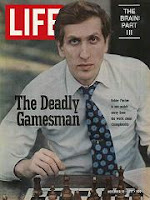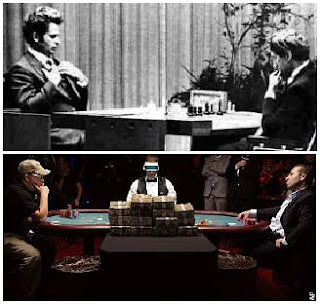The Failed Ambassador
 Was listening to NPR’s “On the Media” yesterday and heard a segment about Bobby Fischer, the iconoclastic chess champ who died last week in Iceland at the age of 64. I knew the broad outlines of Fischer’s story – his precocious beginnings, his heroic-seeming triumph over the Russian Boris Spassky in 1972, and his subsequent exile from America. I’d also known about the crazy-ass anti-Semitic stuff and his hatred of America, although I don’t think I realized the extent of those feelings until I heard some of those stories about him last week.
Was listening to NPR’s “On the Media” yesterday and heard a segment about Bobby Fischer, the iconoclastic chess champ who died last week in Iceland at the age of 64. I knew the broad outlines of Fischer’s story – his precocious beginnings, his heroic-seeming triumph over the Russian Boris Spassky in 1972, and his subsequent exile from America. I’d also known about the crazy-ass anti-Semitic stuff and his hatred of America, although I don’t think I realized the extent of those feelings until I heard some of those stories about him last week.Fischer’s victory over Spassky -- played out against the highly-charged backdrop of the Cold War -- created a not-insignificant surge in the popularity of chess in America. Fischer biographer Frank Brady was interviewed for the segment, and he spoke about the profound effect the PBS coverage of the Fischer-Spassky match -- for which Brady was a correspondent – had on the nation.
“It really created a sensation,” says Brady. “People in New York City and throughout the nation were playing in restaurants, and playing on park benches, and playing all over the place. All of a sudden chess dominated the country like it normally would dominate in the Soviet Union. I mean, the U.S. Chess Federation had about 5,000 members before 1972, and around 1973 they had about 100,000 members. And people were playing in tournaments all over the country -- as they still are.”
This kind of talk made me think a bit about poker and, of course, Chris Moneymaker’s victory in the 2003 WSOP Main Event, a salient moment in the game’s history. Indeed, Brady went on to talk about how the “Fischer effect” (so to speak) continues to have its influence in America today. “We’re still feeling the strength and vitality of Fischer,” says Brady.
Of course it didn’t take that long -- maybe a couple years -- before people stopped buying the onyx chess sets and books about chess and the game again faded into the background of the general popular culture landscape. From the mid-70s onward, membership in the USCF declined rapidly (back down under 50,000), though today has built back up to around 80,000 members.
One factor causing the rapid decline in the popularity of chess was likely Fischer’s utter unsuitability to function as a spokesperson or “ambassador” for the game. In 1975 Fischer would end up forfeiting the world title to Anatoly Karpov after refusing to agree to terms for his title defense. There followed years of obscurity until he reemerged in 1992 to play –- and defeat –- Spassky once again in an exhibition match. That match took place in Yugoslavia, and the U.S. government claimed Fischer’s participation was in violation of U.N. sanctions against that country. Facing arrest should he return to the States, Fischer became a political exile.
He’d spend the rest of his life living in Hungary, the Philippines, and Iceland, occasionally surfacing via phone calls to radio talk shows via which he shared his increasingly bitter (and bizarre) views about Jews and the U.S. Though some dismissed Fischer as a madman, Brady disagrees, simply judging him to have been “a mean-spirited son of a bitch.”
 People talk about the “poker boom” having ended or at least slowed down, but when you compare the recent history of poker to what happened to chess in the 1970s, it is clear that poker’s stunning growth in popularity following Moneymaker’s 2003 WSOP victory is more than just a passing fad. And while there are a number of factors that have particularly helped poker (television and online poker being the most obvious), one has to give Moneymaker some credit for having been a much better ambassador for the game than Fischer was for chess. Had Moneymaker, too, been a “mean-spirited son of a bitch” and gone down some sort of self-destructive and/or hurtful path as did Fischer, poker surely would’ve suffered as a result.
People talk about the “poker boom” having ended or at least slowed down, but when you compare the recent history of poker to what happened to chess in the 1970s, it is clear that poker’s stunning growth in popularity following Moneymaker’s 2003 WSOP victory is more than just a passing fad. And while there are a number of factors that have particularly helped poker (television and online poker being the most obvious), one has to give Moneymaker some credit for having been a much better ambassador for the game than Fischer was for chess. Had Moneymaker, too, been a “mean-spirited son of a bitch” and gone down some sort of self-destructive and/or hurtful path as did Fischer, poker surely would’ve suffered as a result.There are other factors, too. The fact that poker isn’t as difficult to learn as is chess -- relative amateurs can jump in and even win at poker (not the case in chess) -- is probably the single biggest reason for poker’s endurance. Even so, poker players interested in the vitality of the game can’t honestly deny Moneymaker’s important contribution. Listening to Fischer’s story only confirms that to be true.
If you’re curious, here’s that “On the Media” segment on Fischer:
Labels: *the rumble














4 Comments:
I think that one of the things that helped the Moneymaker effect was the Raymer and Haschem effect as well.
While Bobby Fischer carried the torch by himself, and rather poorly, Raymer and Haschem joined the ranks.
Jamie Gold, while a horrible ambassador, did provide someone to hate (ala - The Green Bay Packers or the New York Yankees). Adding to his lore by playing horribly on HSP.
What I'm worried about is the Yang Effect on poker. What will a luckbox/stale personality do to the game.
A pro winning the Main Event will likely help sustain poker as well. Baby! Can you imagine if Scotty Nyugen had won it this year, or Gus Hanson? Each had a shot, but I think that a pro like that winning the whole thing will bring credibility to the game. (Oh, I get goosebumps thinking of Scotty taking a sip of his Cristal and looking at Yang and saying "If you call its all over baby," Yang goes in the tank and makes yet another horrible call, only this time, he doesn't suck out)
Not just any Gold or Yang will win it everytime, but a bonified pro will do it too. Look for Allen Cunningham to go deep again this year. Or the return of Dan Harrington.
Good point about Raymer/Hachem, OhCapt. Yea, that Nguyen flame out was a serious bummer. I can't even watch the ESPN repeats of his bustout -- have to turn it off.
Good article Shamus, I've been following the blog for a short time (due to a love of poker and noir).
A lot of poker conversations with a playing buddy at work seem t revolve around how poker is the new chess but with better applications to the real world. Chess: you have all the pieces in front of you, including your opponent's and thus make plays based on all available outcomes. Poker you are forced to evaluate your opponent's hands based on betting, position, tells etc. It seems a much better form of 'practice' of dealing with people in business and society.
I'm sure there's an article in there somewhere.
Keep up the good work, I enjoy reading about your Omaha adventures. (Hand analysis...better than chess move analysis because of the included chat box action)
Great post!
I've commented many times to chess-playing friends and others about the similarities between the chess boom and the poker boom, both of which I've lived through/am living through personally (although I was a mere slip of a boy in the former case :) ).
Post a Comment
<< Home